Will Journalists Be Replaced by Artificial Intelligence (AI)?
Recent claims from some of Europe’s media giants that artificial intelligence (AI) could potentially replace journalists have sent shockwaves through the industry.
The very core of journalism — human-driven storytelling, investigation, and commentary — is under examination. But is the AI takeover of journalism a boon, bane, or a bit of both?
AI Threatens the Very Core of Journalism
Axel Springer SE, one of Europe’s foremost media groups, fired a salvo when CEO Mathias Döpfner warned that AI might not just improve but replace independent journalism. He envisioned a future where AI surpasses human capabilities in information aggregation.
Döpfner conceded that journalists would always be needed to delve into human motives. Still, he emphasized the significance of exclusive content machines cannot produce.
“In short, the creation of exclusive and attractive content remains irreplaceable and is going to become even more critical to success for publishers. Only those who create the best original content will survive,” Döpfner said.
But this is not just a lone voice. Tech giant Google is also testing the waters with Genesis. This is an AI tool capable of generating news stories. Billed as an assistant for journalists, Genesis has garnered mixed reactions.
Some herald AI as a liberator from mundane tasks, allowing journalists to focus on core activities. But skeptics worry about losing jobs and the human touch.
“Artificial intelligence has the potential to make independent journalism better than it ever was – or simply replace it,” Döpfner added.

Jenn Crider, a Google spokeswoman, clarified the company’s stance, stressing that these AI tools would not replace the central role of journalists but might offer alternative headline options and writing styles.
“Quite simply, these tools are not intended to, and cannot, replace the essential role journalists have in reporting, creating and fact-checking their articles,” Crider said.
Attributing Content Creation Functions to AI
Yet, the most profound challenge comes as AI ventures into the heart of journalism, content creation. Machines, with their advanced algorithms, are now poised to take over tasks once deemed solely human.
For instance, Germany’s largest tabloid, Bild, is a testament to this, having announced significant layoffs, attributing many functions to machines.
“We are approaching the topic with an open mind and currently have many initiatives with which we are exploring areas of application for AI for our journalistic brands, both in the production processes of the editorial offices and in relation to the reader experience,” a Bild spokesperson said.
It is a saddening moment in the timeline of journalism. Traditionalists argue that the very soul of journalism lies in human creativity, empathy, and the nuances of storytelling — elements machines might never grasp.
However, the reality of the industry’s future might be a blend. Premium media houses will likely preserve their star journalists, adding a human touch to their brand amid a sea of AI-driven content. But for many mid-range journalists, the future might be riddled with uncertainty.
Disclaimer
In adherence to the Trust Project guidelines, BeInCrypto is committed to unbiased, transparent reporting. This news article aims to provide accurate, timely information. However, readers are advised to verify facts independently and consult with a professional before making any decisions based on this content.